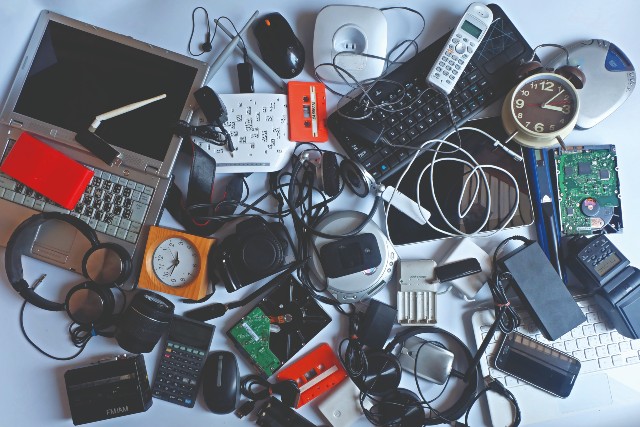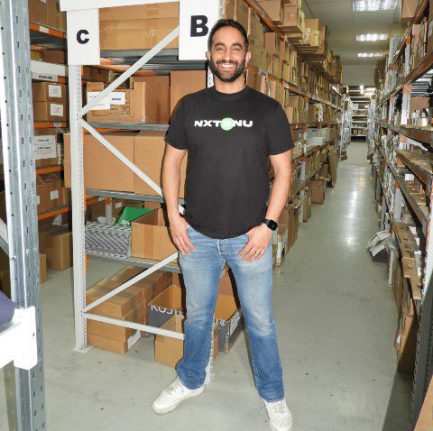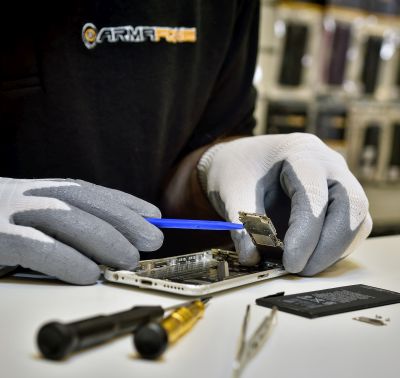Physical Address
304 North Cardinal St.
Dorchester Center, MA 02124
Physical Address
304 North Cardinal St.
Dorchester Center, MA 02124

Technology has become a vital part of life over the past couple of decades, with new smartphones, laptops, wearables and other products appearing on the market every day.
But this range of choices comes with severe consequences, as the world faces an environmental crisis partly due to the amount of electronic waste produced by companies and households.
One recent study estimated that in 2021 alone, the global mountain of e-waste outweighed the Great Wall of China, at 57 million tonnes.
Taking these findings into account, the Royal Society of Chemistry has called for a global effort from governments, businesses and the public to develop a stronger circular economy.
If action is not taken, experts say the UK could become the biggest e-waste producer per capita in Europe by 2024, overtaking current leaders Norway.
Players in the repair and refurbished industry talk of the trends and urgent need to resolve such problems.
Chris Everitt, managing director of mobile repair specialist ArmaFone, isn’t surprised by the data from 2021.
“We’re not just talking about mobile phones and laptops now – the first generation of other types of ‘smart’ devices are coming to the end of their useful life and an upgraded version is available,” he says.
“But I also think we are at a stage where increased noise around e-waste is playing on our collective consciousness and we are recycling some of our ‘hoarded’ e-waste such as that drawer full of superseded mobile phones at home.
“However, the ongoing increase in consumption of electronics-reliant devices could surpass the trend of donating old devices.”
Like Everitt, Matt Thorne, co-founder of refurbished tech company Reboxed, isn’t shocked by the latest findings, saying the acceleration of technology shows no signs of stopping.
“As a society, we are hitting peak consumption,” he says. “As marketing and social media combine, our desire for more is exploited.
“With technology being such a symbol of status, it’s no wonder people are in a rush to upgrade and discard the previous device.”

As well as smartphones, chargers and laptops, many more items – such as toothbrushes and hairbrushes – are now more commonly electronic.
These items are not easily recycled, with overconsumption and overproduction of electronics meaning that more goes into landfill because consumers don’t know how to discard devices properly.
Sunny Ratnam, founder of refurbished company Nxt2Nu, believes there isn’t enough public awareness about how to dispose of electronics.
“There are plenty of great solutions out there, but people are either not aware or they have had a bad experience with a process that may be too arduous for them,” he says.
“The trick is to make it effortless for the consumer to deal with. This will enable the volume to come back through the appropriate routes.”
More than two-thirds of British households are hoarding old phone chargers at home, while there are up to 60 items of old, unused tech per household, according to research by global tech company Okdo.
The sooner a device gets recycled, the greater the chance it can be reused, and many big retailers, specialist repair facilities and charities will take used electronics.
Thorne emphasises the importance of recycling devices as soon as possible. “At the end of life, most local recycling centres cater for electronics with specific skips and there are plenty of online initiatives too,” he says.
Everitt says the recycling industry is adapting, with a whole new segment now focusing on e-waste and raising awareness of the damage it causes.
“The development of the e-waste sector is a step behind the sector that creates the electronics in the first place.
However, governments and councils can do a lot more. “Increasing the awareness of the facilities that are already available is the next step that needs to be taken at this stage.”

Like Everitt, many climate activists have been asking the UK government to put more effort and funding into finding a solution for saving the environment.
Recent research from US cartridge supplier Toner Buzz revealed that for every million mobile phones recycled globally, we could recover more than 35,000 pounds in weight of copper.
Not only that, but if we safely dispose of electronic devices through recycling, we could also stop toxic and hazardous materials from damaging people’s health and the environment.
Thorne also calls on global governments to crack down on overproduction and find ways to prevent e-waste from spiralling out of control.
“Governments can enforce more ethical production and design standards on manufacturers, ensuring things are made to last and clamping down on planned obsolescence,” he says.
“Enforcing initiatives like right-to-repair will also help level the playing field and cut down on waste.”
But in the end, Ratnam thinks that although the government can add further regulation, the general public themselves ultimately need to be aware of the urgency of taking responsibility into their own hands.
“Just because there aren’t stringent rules in place doesn’t mean we should carry on the way we are,” he says.
“It is on us to make the changes in our behaviour which will support the overall goal, and we should look internally rather than externally for the solutions.”
As well as the public and global governments, large businesses and manufacturers have been called on to improve sustainability.
A recent survey by software company SOTI revealed that almost seven in ten IT leaders of international companies thought firms were discarding devices too early, even though 60 per cent of leaders had targets in place for cutting e-waste.
“Tech giants cannot ignore the environmental movement; to do so could marginalise themselves,” says Everitt.
“We are seeing some third-party and self-repair options emerging. I believe that will gain momentum and become more accessible, which is a positive thing for the consumer, the repair industry and the planet.”
He also thinks manufacturers can help cut down e-waste by including a set of ‘close down’ options with devices to guide the consumer on what to do once they are no longer usable.

Ratnam says manufacturers, businesses and brands need to shift their focus from short-term profitability to sustainability, while Thorne is optimistic that this shift will occur soon.
“Every business and brand across most industries will now be striving to be more sustainable,” he says.
“There are many ways of doing this, from ethical sourcing to using sustainable materials in products, packaging and marketing, and using local sustainable suppliers and partners where possible.”
It is estimated that the carbon footprint of gadgets and internet use may make up two to five per cent of global greenhouse emissions, with manufacturing of these products accounting for a significant chunk of this percentage.
But with more and more unique refurbished and repair companies emerging, the public now has access to more sustainable ways of purchasing tech.
At Nxt2Nu, Ratnam says the company has a “sustainability roadmap” to build trust in refurbished technology, while also providing customers with a free biodegradable case and fully recyclable packaging when they purchase a device.
“I’m proud to say we have achieved what we set out to do initially and ahead of what we originally planned for,” says Ratnam.
“Doing things like this is a way of developing a business culture that holds sustainability as a core objective – that’s how we plan to deliver long-term sustainability.”
Meanwhile, Everitt says ArmaFone’s tech-repair service contributes to the circular economy and extends the lifespan of electronics by taking in damaged devices, then refurbishing and selling them.
“We work with local recyclers to process e-waste correctly and we are experiencing an increasing number of businesses that will take refurbished devices,” he says.
“Whether to keep costs down or for environmental reasons, I can only see that as a positive trend.”
Reboxed focuses on the customer experience and encourages reuse over buying new, as well as finding ways to make the experience straightforward.
“We’re building our platform out to make this super-easy, from smart financial ways to pay to easier ways to upgrade, so customers can unlock dormant value,” Thorne says.
“Alongside this, we’re working hard to make sense of all the data around environmental issues, so we can help customers to track their impact and build a profile of their sustainability which we can later reward in the form of discounts and other benefits.”

A Uswitch study from May showed that 22 million Brits are currently considering buying a refurbished phone, A third of those people are motivated by the desire to make sustainable choices, while 24 per cent are motivated by price.
Everitt believes it will become more acceptable to own older devices given that the cost of some flagship smartphones is now surpassing £1,000, and that many people will turn to the used market due to social and economic influences.
But with some forecasting that global e-waste will double by 2030 compared with 2014, can we keep things under control?
“The smart device and IoT market is currently undergoing a steep development curve across a wide range of products and services, all adding to the volume of e-waste generated,” says Everitt.
“Therefore, I believe that the total volume of e-waste is set to increase, but I think the proportion of waste generated from every purchased device will decrease.”
Ratnam believes time will tell and that it’s hard to guess how much e-waste will be produced in the next decade.
“There is certainly more awareness of the long-term damages we are causing through short-term focuses,” he says.
As a result, he has his fingers crossed that the green transition will happen at real scale. “I would like to think we are seeing a change now in people’s understanding and perception, as it’s undeniable what will happen if we don’t make a change for the better.”
